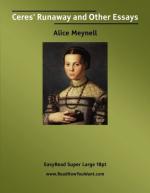A revolt against the oppression of the late sixteenth and early seventeenth centuries—the age of the re-discovery of death; against the crime of tragedies; against the tyranny of Italian example that had made the poets walk in one way of love, scorn, constancy, inconstancy—may have caused this trolling of unconsciousness, this tune of innocence, and this carol of liberty, to be held so dear. “I heard a maid in Bedlam,” runs the old song. High and low the poets tried for that note, and the singer was nearly always to be a maid and crazed for love. Except for the temporary insanity so indifferently worn by the soprano of the now deceased kind of Italian opera, and except that a recent French story plays with the flitting figure of a village girl robbed of her wits by woe (and this, too, is a Russian villager, and the Southern author may have found his story on the spot, as he seems to aver) I have not met elsewhere than in England this solitary and detached poetry of the treble note astray.
At least, it is principally a northern fancy. Would the steadfast Cordelia, if she had not died, have lifted the low voice to that high note, so delicately untuned? She who would not be prodigal of words might yet, indeed, have sung in the cage, and told old tales, and laughed at gilded butterflies of the court of crimes, and lived so long in the strange health of an emancipated brain as to wear out
Packs and sects of great ones
That ebb and flow by the moon.
She, if King Lear had had his last desire, might have sung the merry and strange tune of Bedlam, like the slighter Ophelia and the maid called Barbara.
It was surely the name of the maid who died singing, as Desdemona remembers, that lingered in the ear of Wordsworth. Of all the songs of the distracted, written in the sanity of high imagination, there is nothing more passionate than that beginning “’Tis said that some have died for love.” To one who has always recognized the greatness of this poem and who possibly had known and forgotten how much Ruskin prized it, it was a pleasure to find the judgement afresh in Modern Painters, where this grave lyric is cited for an example of great imagination. It is the mourning and restless song of the lover ("the pretty Barbara died”) who has not yet broken free from memory into the alien world of the insane.
Barbara’s lover dwelt in the scene of his love, as Dryden’s Adam entreats the expelling angel that he might do, protesting that he could endure to lose “the bliss, but not the place.” (And although this dramatic “Paradise Lost” of Dryden’s is hardly named by critics except to be scorned, this is assuredly a fine and imaginative thought.) It is nevertheless as a wanderer that the crazed creature visits the fancy of English poets with such a wild recurrence. The Englishman of the far past, barred by climate, bad roads, ill-lighted winters, and the intricate life and customs of the




